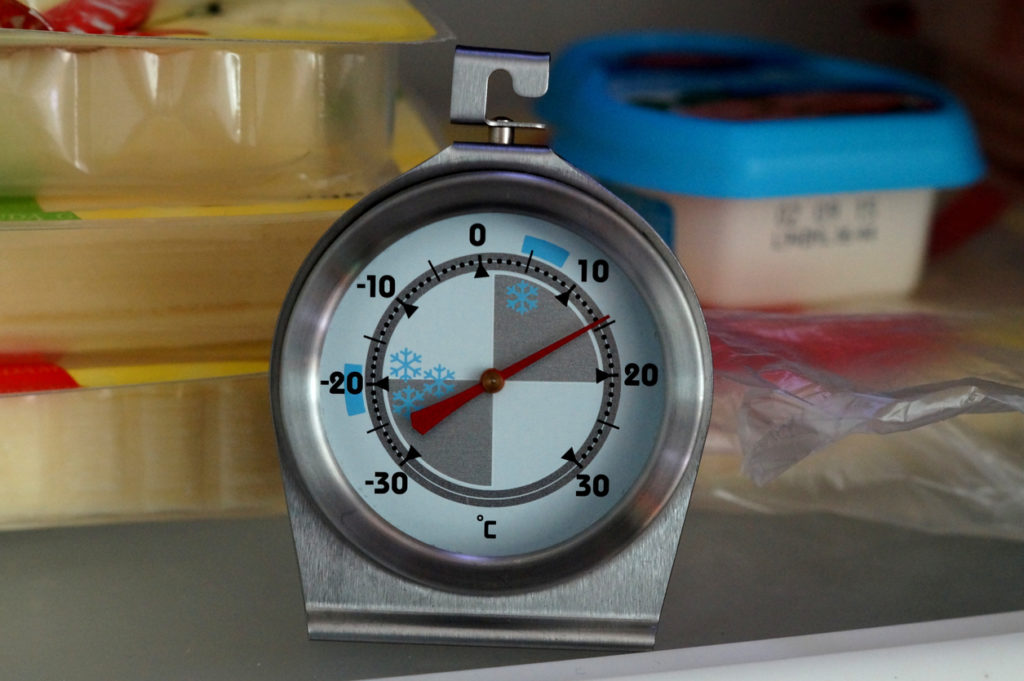How To Measure Fridge Temperature
- Home /
- News & Advice /
- How To Measure Fridge Temperature
- December 1st, 2018
- 2 Comments
- Posted in advice centre, frequently asked questions

It’s important to keep food stored at the right temperature to avoid meat and dairy products from developing or growing unwanted bacteria or enzymes. Or, freezing and damaging foods such as salad and dairy products. A fridge that won’t cool down, or one that’s too cold, won’t do its job properly, meaning the food you store in it might have to be thrown out.
Although, generally, fridges do a good job of maintaining temperatures, there are a range of issues that can cause too high or low temperatures in your household fridge.
Knowing how to check a fridge’s temperature will help you determine whether it is suffering from a temperature keeping issue and decide whether you need to repair it.
What makes a fridge cold?
Most refrigerators that are part of a combination fridge freezer get cooled by the freezer itself, with an evaporator fan in the freezer circulating cold air into the fridge through vents. The air is cooled by several other components, including the condenser fan motor and the compressor, and the temperature they cool the air to is set by the thermostat.
How to check fridge temperature
There are several methods of measuring your fridge’s temperature.
- The most obvious method is to use a specialist fridge thermometer, which is widely available and is specifically designed for this purpose.
- But if you don’t have one available, you can use a regular body thermometer which has been put in a cup of water and left in the fridge for 2 hours. Placing the thermometer in a cup of water means you’ll get a clearer idea of the temperature your food is being cooled to.
- Another option is using an instant read thermometer, which will give you quicker results, and like the regular body thermometer will allow you to check the food temperature rather than the fridge temperature.
What’s a normal fridge temperature?
Generally, fridges should be between 0° Celsius and 4° Celsius (32°-40° Fahrenheit). Above this level, food will begin to go off. Temperatures above 4° Celsius creates the optimum temperature for bacteria to grow in. Below it, food will start to freeze.
Keep in mind that some temperature fluctuations are to be expected from the door being opened, or new uncooled items being placed into the fridge.
My fridge is too cold/hot
If your fridge is at the wrong temperature, adjust the thermostat accordingly.
The numbers don’t correspond directly to degrees but generally the higher the number, the lower the temperature
If your thermostat doesn’t seem to be changing the temperature, it could be broken and may need replacing. You can confirm whether it’s broken by testing it with a multimeter, which is a basic handheld device for finding basic faults in electrical devices.
Comments
MGlotech
Monday, July 29, 2019 at 5:56 pmIt depends a bit on the fridge but if the top is much higher than the bottom then there might be something wrong with the fridge.
Some fridges have fans in them to circulate the air to even up the temperature but a lot just rely on convection to circulate the air. In any case if the temperature is much higher than 5 degrees at the top then it needs to be cooler or your food will be going off quicker.
Leave a Reply


Scott
Monday, July 29, 2019 at 5:48 pmDo I take the reading from the top shelf or bottom? I’m getting very different readings